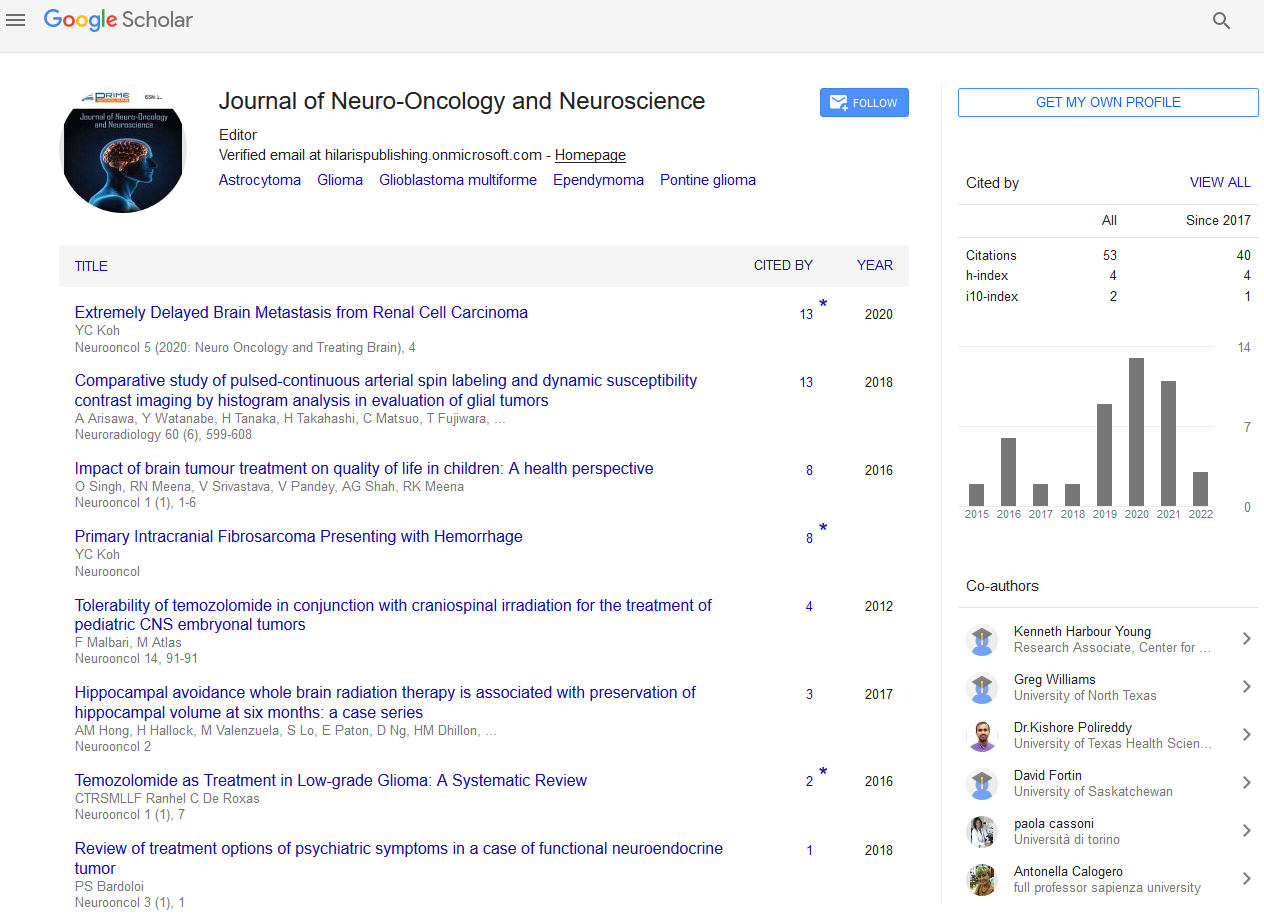Opinion Article - (2023) Volume 8, Issue 3
Precision Strikes: Targeted Therapies for Malignant Brain Tumors
Mohammed Irfan Ahmad*
Department of Medicine, King Saud bin Abdulaziz University for Health Sciences, Jeddah, Saudi Arabia
*Correspondence:
Mohammed Irfan Ahmad,
Department of Medicine, King Saud bin Abdulaziz University for Health Sciences, Jeddah,
Saudi Arabia,
Email:
Received: 30-Aug-2023, Manuscript No. IPJNO-24-19610;
Editor assigned: 01-Sep-2023, Pre QC No. IPJNO-24-19610 (PQ);
Reviewed: 15-Sep-2023, QC No. IPJNO-24-19610;
Revised: 20-Sep-2023, Manuscript No. IPJNO-24-19610 (R);
Published:
27-Sep-2023, DOI: 10.21767/2572-0376.8.3.25
Introduction
Malignant brain tumors, including Glioblastoma Multiforme
(GBM) and anaplastic astrocytoma, pose significant challenges
in clinical management due to their aggressive nature and
limited treatment options. Traditional therapies such as
surgery, radiation, and chemotherapy have shown limited
efficacy in controlling tumor growth and improving patient
outcomes. However, recent advances in molecular biology and
genomics have led to the development of targeted therapies
that hold promise for more precise and effective treatment of
malignant brain tumors.
Description
Targeted therapies are designed to interfere with specific
molecular pathways or genetic abnormalities that drive
tumor growth and progression. By selectively targeting cancer
cells while sparing normal tissues, these therapies offer the
potential for improved efficacy and reduced toxicity compared
to conventional treatments. In the context of malignant brain
tumors, several molecular targets and therapeutic agents
have been identified and investigated in preclinical and
clinical studies. One of the well-studied molecular targets
in malignant brain tumors is the epidermal growth factor
receptor (EGFR). Amplification and overexpression of EGFR
are commonly observed in GBM and are associated with
aggressive tumor behavior and resistance to therapy. Targeted
inhibitors of EGFR, such as erlotinib and gefitinib, have been
evaluated in clinical trials for the treatment of GBM, with
mixed results. While some patients show initial responses to
EGFR inhibitors, acquired resistance often develops, limiting
their long-term efficacy. Another promising molecular target
in malignant brain tumors is the vascular endothelial growth
factor (VEGF) pathway. VEGF plays a critical role in promoting
angiogenesis, the process by which tumors develop new blood
vessels to sustain their growth and metastasis. Bevacizumab,
a monoclonal antibody that targets VEGF, has been approved
for the treatment of recurrent GBM based on its ability to
reduce tumor-associated edema and improve progression-free
survival. However, the survival benefit of bevacizumab remains
modest, and resistance inevitably develops over time.
In addition to EGFR and VEGF, other molecular targets implicated
in malignant brain tumors include the phosphoinositide
3-kinase (PI3K)/AKT/mTOR pathway, the mitogen-activated
protein kinase (MAPK) pathway, and the tumor suppressor
protein p53. Targeted inhibitors of these pathways, such
as temsirolimus (mTOR inhibitor) and selumetinib (MAPK
inhibitor), have shown promise in preclinical studies and earlyphase
clinical trials for GBM and other malignant brain tumors.
However, challenges such as tumor heterogeneity, treatment
resistance, and off-target effects remain significant hurdles in
the development and implementation of targeted therapies
for malignant brain tumors. Despite these advancements,
targeted therapies for malignant brain tumors still face several
challenges in clinical practice. Tumor heterogeneity, the
development of resistance mechanisms, and the blood-brain
barrier pose significant obstacles to effective drug delivery
and treatment response. Moreover, the high cost of targeted
therapies and the lack of biomarkers to predict treatment
response limit their widespread adoption and accessibility.
Conclusion
Targeted therapies represent a promising approach for the
treatment of malignant brain tumors, offering the potential
for more precise and effective treatment strategies compared
to conventional therapies. By selectively targeting specific
molecular pathways and genetic abnormalities driving tumor
growth, targeted therapies hold the promise of improving
patient outcomes and quality of life. However, further research
and clinical trials are needed to overcome the challenges
associated with targeted therapies and realize their full
potential in the management of malignant brain tumors.
Citation: Ahmad MI (2023) Precision Strikes: Targeted Therapies for Malignant Brain Tumors. Neurooncol. 8:025.
Copyright: © 2023 Ahmad MI. This is an open-access article distributed under the terms of the Creative Commons Attribution License, which permits unrestricted use, distribution, and reproduction in any medium, provided the original author and source are credited.

